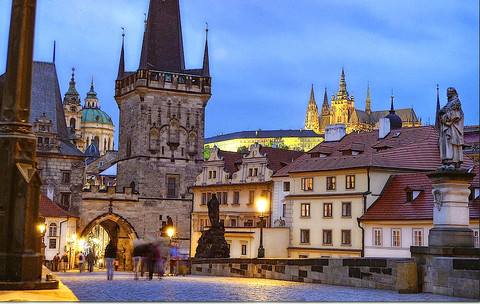[ad_1]

These are turbulent times in the Czech Republic. Just as the country looked set to buy the Russian Sputnik V vaccine last month, the eruption of the country’s biggest row with Moscow since the fall of communism brought such a ‘shift to the East’ to a juddering halt.
Now, fears are emerging about the extent of Russian influence throughout Czech society, on issues ranging from vaccines to foreign investment.
On April 17, Czech prime minister Andrej Babiš called an emergency press conference to announce that “unequivocal evidence” links Russian secret agents to the massive explosion at an arms depot near the Moravian village of Vrbětice in 2014.
The explosion killed two workers at the site, and has been described by Czech politicians as an act of “state terrorism”. The attack was attributed to the same GRU Unit 29155 operatives also believed responsible for the Salisbury, UK, poisoning in 2018.
In the wake of the revelations, 81 staff at the Russian Embassy in Prague were told to leave the country.
The expulsion of diplomats known to be linked to foreign intelligence seemed to confirm long-held fears that the embassy has acted as a hub for Russian covert operations – and it is believed other countries in the region face similar problems.
According to research fellow at the Czech Association for International Affairs, Pavel Havlíček, “the Russian Embassy in Prague is unduly large – but so are others in central Europe. Evidence of Russian covert activity here should be a wake-up call for the entire region.”
V4 split
Although the Visegrád Four (the Czech Republic, Hungary, Poland and Slovakia) have a history of banding together to fight perceived violations of national sovereignty by Brussels, organising a joint response to hostile Russian activity is proving surprisingly difficult.
Hungary has refused to expel any Russian diplomats over the Vrbětice affair, and insisted on a watered-down Visegrád Four declaration of support for the Czech Republic.
As Emil Aslan, research director of Prague’s Institute for International Affairs, says: “divisions on Russia are now likely to deepen. Poland and the Czech Republic are likely to tilt towards the EU and Nato, but Hungary, under Orbán’s government, will continue with its more pro-Russia stance.”
Many in the region are concerned that, when it comes to hostile eastern influences, intelligence activities are only the tip of the iceberg. According to Havlíček, the pro-Kremlin affiliation of various radical paramilitary organisations is a significant cause for concern throughout central Europe.
“There are fears that paramilitary groups in the Czech Republic and Slovakia are collaborating with the East against the state,” he says. “The infiltration of society runs much deeper than oversized embassies.”
A number of paramilitary groups were formed throughout central Europe following Russia’s annexation of Crimea in 2014.
In the Czech Republic, the so-called Czechoslovak Army Reservists for Peace group has ties to pro-Kremlin separatists in Ukraine, and along with other similar organisations, is marked by a fiercely anti-EU, anti-Nato and anti-globalisation ideology.
In Slovakia, the notorious Slovak Conscripts group have links with Russia’s Kremlin-affiliated Night Wolves motorcycle gang.
Such paramilitary organisations attempt, along with far-right political parties, to destabilise affiliation with Western organisations while advocating pan-Slavic, pro-Russia sentiments.
Infiltration by anti-Western forces is also thought to be linked to an embedded Russian economic presence, which is now being viewed with an increasing sense of distrust.
‘Entrepreneurs’ or agents?
Jiři Pehe, a former Czech political cabinet member and current director of the New York University in Prague, notes suspected links between non-transparent business dealings and Russian money laundering activities, claiming “a large number of Russian ‘entrepreneurs’ operating in the Czech Republic are suspected of representing Russian state interests”.
Pehe says the threat to domestic security will only be resolved with a thorough crackdown on such economic and societal forces. “If we want to talk about sovereignty in the Czech Republic, expelling a few Russian operatives from the embassy doesn’t go far enough”.
There are already signs that a counter-offensive is being launched against Moscow’s economic clout, with Russian bidder Rosatom set to be excluded from a forthcoming €6bn nuclear power development project.
Yet as the Czech Republic tries to extricate itself from Eastern influence – including a sudden U-turn on the possible acquisition of Sputnik V – it is becoming increasingly clear that a serious response will need to take into account a far wider range of political and social factors, responsible for a steady increase in Russia’s influence in the country over a number of years.
And when it comes to ensuring sovereignty in central Europe, there is an elephant in the room.
As in other countries in the region, Czechs are weighing security concerns about the Nord Stream 2 gas pipeline project against its promised economic benefits.
“The security and political implications of Nord Stream 2 are clear,” says Havlíček. “But the Czech Republic would be a beneficiary, so perceptions are balanced. There is a paradox: we are opening the doors to Russian influence, while simultaneously attempting diplomatic actions against Moscow.”
In a recent show of solidarity with the Czech Republic, MEPs in Brussels passed a non-binding resolution which, along with the expulsion of Russian diplomats throughout the EU, called for Nord Stream 2 to be halted.
But as Havlíček notes, the project is almost complete, and without a major shift in Germany’s stance, increased energy dependence on Russia appears a certainty.
The disintegration of relations between Prague and Moscow has brought into focus the worrying extent of Russian influence throughout Czech politics and society. The expulsion of diplomats with links to covert activities is a first corrective step, ending the country’s recent slide to the East.
But Russian influence in the Czech Republic, and in other Central European countries, is a long-term issue – and many are now concerned that it might be too late to remove more deeply rooted malign Russian forces from society.
[ad_2]
Source link